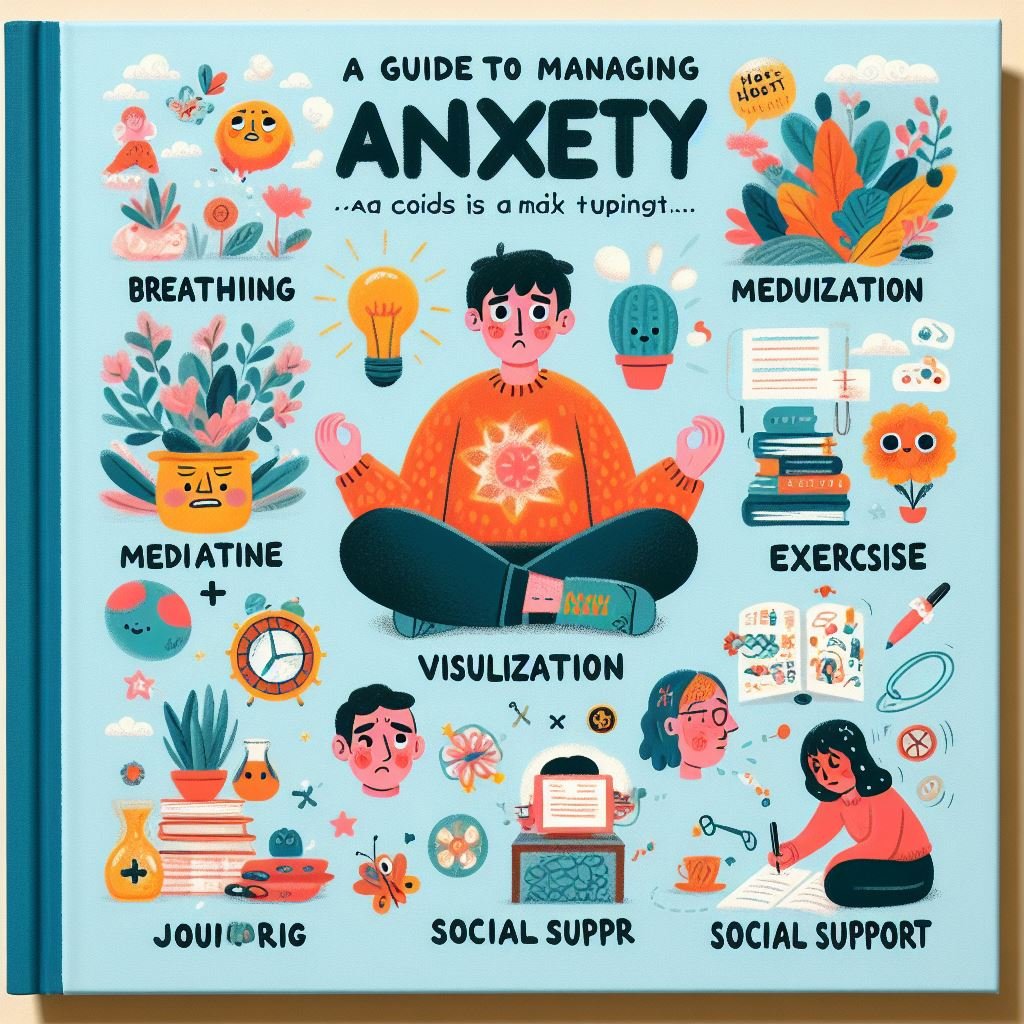Managing Stress and Anxiety
Dealing with stress and anxiety is like exploring two different feelings. Stress usually happens when something outside makes you feel worried or upset. It can be a short-time thing, like having too much work or having an argument with someone you care about. Or it might stick around for a long time, like not having a job, facing unfair treatment, or having health problems.
When people feel stressed, it can make their minds and bodies feel a bit funny. They might get grumpy, tired, or have problems like muscle pain, tummy issues, and trouble sleeping. It’s like their bodies are telling them, “Hey, something’s not quite right.”
Remember, it’s okay to feel this way sometimes, and there are ways to make it better. Talking to someone you trust or doing things you enjoy can help your mind and body feel happier. So, let’s keep exploring ways to make our days brighter!
Worrying a lot, even when things are okay, is called anxiety. It can make you feel tired, have trouble sleeping, and get easily annoyed, just like when you’re stressed.
The good news is, if you have a little stress or anxiety, you can try doing exercises, eating good food, and sleeping well to feel better. But if these don’t work, or if stress and anxiety are making your days hard, it’s okay to talk to someone who can help, like a mental health professional.
They can understand what you’re going through and share more ways to feel better. Sometimes, anxiety can last a long time and make you feel different. If that’s happening, a psychologist can help you figure things out and give you tools to feel better. Just remember, there’s help available, and you don’t have to go through it alone!

Some Common Disorders Happen Due to Stress and Anxiety
1. Repeating Thoughts (OCD):
Sometimes, you can’t stop thinking the same things over and over, like worrying if you turned off the lights, so you keep checking many times. This might be Obsessive-Compulsive Disorder (OCD).
2. Flashbacks or Feeling Scared (PTSD):
If you keep feeling scared or remembering something tough that happened before, like a bad accident or a loud noise, that might be Post-Traumatic Stress Disorder (PTSD).
3. Nervous Around Others (Social Anxiety):
When you get super nervous or shy in situations where you have to talk to people, like in a group or at a party, that’s social anxiety. It’s like feeling very shy when meeting new friends.
4. Worrying a Lot About Different Things (GAD):
If you’re always worrying about things, even if you don’t know exactly why, like being scared about what might happen tomorrow or if you’ll do well in school, that could be Generalized Anxiety Disorder (GAD).
5. Extreme Fear with Fast Heartbeat (Panic Attacks):
Sometimes, you might suddenly feel really scared, your heart beats super fast, and you can’t breathe well. This might be a panic attack. For example, feeling very scared when you’re alone at home.
If these feelings happen a lot and make your life tough, talking to someone who understands, like a mental health professional, can help. They can share ways to make you feel better. Just know you’re not alone, and there’s support for you!
How To Manage Stress and Anxiety

Here are I have included 12 practical ways, backed by evidence, to reduce stress and anxiety:
Take Breaks from Screens:
Spending too much time on phones or computers can worsen stress. It’s crucial to take breaks. For example, set aside time each day to unplug and enjoy activities without screens.
Enjoy Human Touch:
Positive physical contact, like hugs, can release oxytocin, lowering stress levels. Consider hugging a friend or family member to boost your mood.
Write Down Your Thoughts:
Journaling can be a positive outlet, reducing stress and anxiety. For instance, jot down your feelings before bedtime to clear your mind.
Practice Mindfulness:
Engage in mindfulness techniques like meditation to boost your mood and reduce stress and anxiety. Use apps or guided sessions to get started.
Eat Good Food:
A balanced diet with veggies, fruits, beans, fish, nuts, and seeds supports mental health. For instance, try incorporating colorful vegetables into your meals.
Spend Time in Nature:
Being outdoors, even for a short while, can improve mental well-being and reduce stress. Go for a walk in a nearby park or spend time in your garden.
Do Things for Yourself:
Taking time for enjoyable activities, like going for a walk or having a relaxing bath, can lower stress levels. Find what makes you happy and prioritize it.
Get Hugs:
Human touch, such as hugging, may have a calming effect and help you cope with stress. Consider hugging a pet or loved one when you’re feeling stressed.
Cut Down on Tea and Coffee:
Consuming too much caffeine can worsen anxiety and harm sleep, leading to more stress. Consider switching to decaffeinated options.
Practice Yoga:
Yoga combines body and mind awareness, reducing cortisol levels and promoting well-being. Attend a beginner’s yoga class to get started.
Connect with Family & Friends:
Spending time with friends and family provides social support, helping you cope with stress. Plan activities to enjoy together.
Spend Time in Nature:
Spending time in green spaces, like parks or forests, is a healthy way to manage stress. Plan a day trip or picnic to a nearby nature spot.
Our Conclusion on Managing Stress and Anxiety
In the journey of dealing with stress and anxiety, there’s something really special that we might not always think about — it’s love and spending time with the people we care about. As we go through the ups and downs of life, facing stress and anxiety, the people we love become like a safe harbor that keeps us grounded.
Love is like a magic potion that helps us heal. A hug, a kind word, or sharing laughter with loved ones acts as a shield against the tough times. When we’re with those we love, stress seems a bit lighter, and we find comfort and understanding.
Taking time to be with our loved ones is like a superpower against stress. Whether it’s having a meal together, going for a walk, or just talking, these moments weave the fabric of our lives with threads of connection and belonging. In these moments, stress loses its power, making way for joy and the support we get from our loved ones.
In the middle of our busy lives, discovering the real purpose of life becomes like a guiding light. When we look back at our journey, we realize that the true meaning of life is found in the connections we build, the love we give, and the love we receive. It’s in these relationships that we find the true purpose, going beyond the stress to embrace the deep richness of life.
With love and the understanding of life’s purpose, we start a journey towards a more resilient and meaningful life. The temporary challenges of stress give way to the lasting strength of love, and the search for a genuine purpose becomes a roadmap guiding us through life’s twists and turns.
As we wrap up this exploration of handling stress and anxiety, let’s remember that love and meaningful connections not only help us deal with stress but also form the foundation of a fulfilling life. In the story of time spent with loved ones, stress fades away, revealing a canvas painted with the bright colors of shared moments, strong connections, and the beautiful richness of a life filled with love.
You may also refer my post on Effective Ways To Manage Stress.
FAQs
What is the difference between stress and anxiety?
Stress typically arises from external factors causing worry or upset, whereas anxiety involves excessive worrying even when things are okay.
What are some common physical symptoms of stress?
Physical symptoms of stress may include muscle pain, digestive issues, fatigue, and difficulty sleeping.
How can I manage stress and anxiety on my own?
You can manage stress and anxiety by engaging in activities you enjoy, talking to trusted individuals, practising mindfulness, and maintaining a healthy lifestyle with proper diet, exercise, and sleep.
When should I seek professional help for stress and anxiety?
If stress and anxiety persist and significantly impact your daily life, it’s advisable to seek help from a mental health professional who can provide appropriate guidance and support.
What are some common disorders related to stress and anxiety?
Common disorders related to stress and anxiety include Obsessive-Compulsive Disorder (OCD), Post-Traumatic Stress Disorder (PTSD), Social Anxiety, Generalized Anxiety Disorder (GAD), and Panic Attacks.
How can I reduce stress and anxiety levels immediately?
Immediate stress relief techniques include deep breathing exercises, progressive muscle relaxation, taking breaks from screens, and enjoying physical touch like hugs.
What role does diet play in managing stress and anxiety?
A balanced diet rich in fruits, vegetables, lean proteins, and whole grains supports mental well-being and helps in managing stress and anxiety.
How can spending time in nature help alleviate stress?
Spending time outdoors in green spaces can improve mental well-being by reducing stress levels and promoting relaxation.
Why is social support important in dealing with stress and anxiety?
Social support from friends and family provides emotional comfort, reduces feelings of isolation, and helps individuals cope with stress more effectively.
How can I incorporate more love and meaningful connections into my life to combat stress?
Prioritize spending quality time with loved ones, engaging in activities that foster connection, and expressing gratitude and affection to strengthen relationships and reduce stress.



Pingback: घबराहट का अर्थ: हिंदी में जानें | HuntEnder.com
Pingback: 10 Stress-Busting Tips for Calm Living | HuntEnder.com